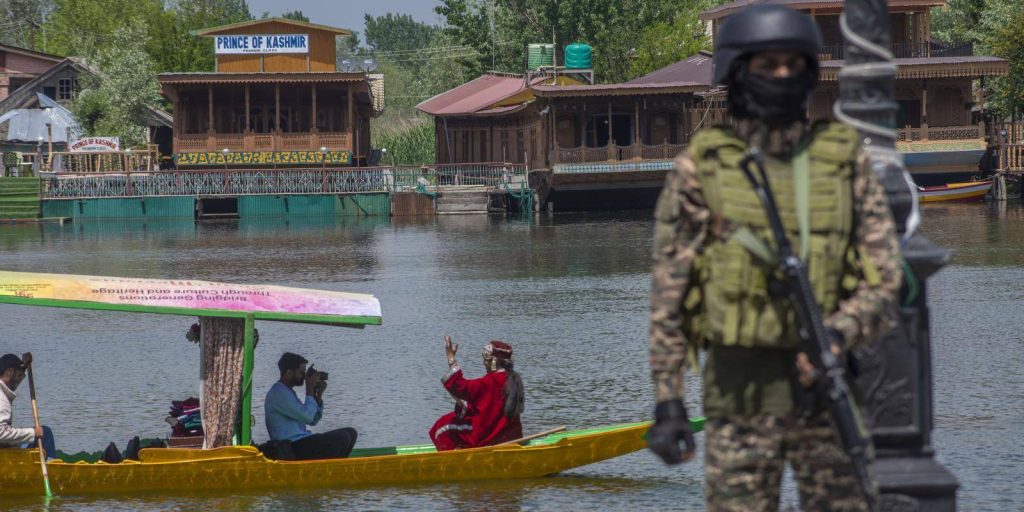On 22 April, a terror attack in the Baisaran Valley near Pahalgam in Indian-administered Jammu & Kashmir claimed the lives of 26 people, mostly Indian tourists. This is the deadliest attack in the disputed territory since 2019, when a car bomb targeting a convoy of buses carrying Indian paramilitary soldiers killed 40 people in Pulwama. More alarmingly, it is the biggest attack targeting civilians in over two decades. The Resistance Front (TRF), a proxy for Lashkar-e-Taiba – a Pakistan-based terrorist organization – has claimed responsibility for the attack, while the civilian government in Pakistan has denied any involvement.
Benign neglect or strategic restraint?
When the government of Prime Minister Narendra Modi assumed power in 2014, it extended an olive branch to Pakistan, inviting then Pakistani Prime Minister Nawaz Sharif and other South Asian leaders to Modi’s inauguration. Modi even visited Sharif on his birthday in 2015.
But relations between India and Pakistan have since deteriorated. In 2016, India carried out so-called ‘surgical strikes’ inside Pakistan-administered Kashmir in response to an attack on an Indian army facility in Uri. In 2019, India launched airstrikes inside Pakistani territory following the Pulwama terror attack. The Modi government’s decision to end the special autonomous status of Indian-administered Kashmir in August 2019 further soured relations between New Delhi and Islamabad.
A degree of benign neglect has since crept into the bilateral relationship with Islamabad, preoccupied with internal instabilities and tensions on its borders with Afghanistan and Iran, while New Delhi has sought to focus on India’s global role and aspirations rather than its chronically difficult relationship with Pakistan. This became apparent during last month’s Raisina Dialogue – India’s premier foreign policy conference – where there was hardly any discussion on India’s neighbourhood.
Whether due to the deterrent effect of the two countries’ nuclear arsenals or simply due to other priorities, there has been a degree of strategic restraint in the India–Pakistan relationship in recent years. A ceasefire along the Line of Control (LoC) demarcating Indian and Pakistan-administered Kashmir has largely held since 2021. In 2022, a missile accidentally launched by India landed in Pakistani territory, but did not trigger a retaliatory response by Islamabad. And despite its more assertive posturing, New Delhi has sought to minimize collateral damage in its retaliatory actions. Of all the countries that Pakistan shares borders with, the border with India has been the most stable in recent years.
Political and geopolitical undercurrents
The attack comes at a time when the Pakistani military is on the back foot following a string of terrorist attacks inside Pakistan and eroding public support for the army following the arrest and imprisonment of former prime minister Imran Khan and the persecution of his supporters. Pakistani army chief Asim Munir has sought to reaffirm the importance of the military to the preservation of the Pakistani state. In a speech last week, he also referred to Kashmir as Pakistan’s ‘jugular vein’.
Although the civilian government in Islamabad has denied involvement, there is precedent for attacks on India taking place during periods when the Pakistani military feels it is being marginalized. In 1999, an attempt at rapprochement between the civilian governments in Islamabad and New Delhi – referred to as the Lahore bus diplomacy – was derailed after Pakistani military-backed militants launched attacks in the Kargil area of Kashmir, leading both countries to war for the fourth time.
The attack also took place when US Vice President JD Vance was visiting India, suggesting it was timed to draw international attention to the Kashmir issue while the spotlight was on India. Similarly, a terror attack took place in Kashmir shortly before President Clinton’s India visit in 2000.
Expect a robust Indian response and Pakistani retaliation.
The Modi government has been tough on security since assuming power, and Modi himself has been referred to as India’s ‘chowkidar’ (or guard) – akin to Israeli Prime Minister Benjamin Netanyahu’s ‘Mr Security’ moniker. The government has pledged to pursue terrorists wherever they may be (‘ghus ke marenge’). In a speech earlier this week, Modi stated that ‘India will identify, track and punish every terrorist and their backers,’ and would pursue the perpetrators ‘to the ends of the earth’. A robust response by India should therefore be expected, including possible military action.
The Indian government has already taken the unprecedented step of suspending the 1960 Indus Water Treaty. This World Bank-brokered water-sharing agreement for rivers that traverse both countries has survived several periods of hostility between India and Pakistan. The Pakistani government has declared any attempt by India to divert water flows in violation of the treaty an ‘act of war’. New Delhi has also ordered the closure of the Attari-Wagah border crossing, reduced the diplomatic presence in both countries, and imposed further restrictions on Pakistani nationals travelling to India.
Pakistan has responded in kind and has also closed its airspace to Indian-owned and operated airlines and suspended trade with India, including through third countries. It has also threatened to suspend all bilateral agreements with India, including the Simla Agreement, which established the LoC. A breakdown of the ceasefire along the LoC and a broader tit-for-tat military escalation cannot be ruled out. Limited skirmishes have already been reported.
New Delhi had been lauding the return of stability to Kashmir in recent years. Elections held in the territory last autumn were largely peaceful with a high voter turnout. Investment and tourism have flourished. This progress will be derailed by the latest attack.
Beyond the impact on Kashmir and India–Pakistan relations, this incident will also have broader regional implications. South Asia is among the least economically integrated regions of the world. The South Asian Association for Regional Cooperation (SAARC) has not held a summit in over a decade, attributed in large part to mistrust in the India–Pakistan relationship.
While New Delhi has tried to develop workaround solutions, such as promoting other regional initiatives, South Asian countries continue to lobby for the resumption of SAARC as the region’s most inclusive and all-encompassing regional forum. But the Pahalgam attack makes this even less likely to happen anytime soon.
For now, there are limited signs of external pressure on India to show restraint in its response to the attack. During previous periods of heightened tensions, the US has played a prominent role in de-escalating tensions, but not this time.
The US recently extradited a Canadian national convicted of complicity in a 2008 attack by Pakistan-based militants in Mumbai, something New Delhi had been demanding for many years. While this demonstrates the Trump administration’s more forthcoming approach to working with India on anti-terrorism cooperation, the US is unlikely to get involved beyond possible intelligence sharing.
Without significant international pressure to de-escalate, the only real restraints on both parties are concerns of a possible nuclear escalation and the impact of a conflict on their economies.

